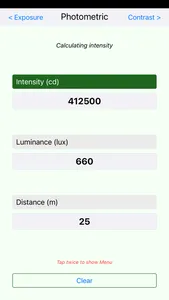Beautifully designed with a user-friendly interface, LuxCalc can calculate:
On the Exposure page: interrelations between luminance (in lux or foot candles), aperture opening, sensitivity and exposure time. Aperture openings can be expressed as numeric (e.g. 6.3) or descriptive (e.g. 5.6+).
On the Photometry page: interrelations between luminance (in lux or foot candle), light intensity (in candela), and distance (in meters or feet).
On the Contrast page: the key light to fill light ratio calculated using the formula: (key + fill) / ill. Key light and fill light values can be expressed as luminance (lux or fc) or as f-stops.
In application settings, users can choose to express exposure time as a combination of frames per second and shutter opening (video style), or as fractions of the second (photo style). Exposure time, aperture opening and sensitivity can be calculated to the precision of a full stop, half stop, one third of a stop or all three. Metric or imperial units, aperture notation (numeric or descriptive), and showing or hiding of calculated raw values for aperture, ISO and exposure time can also be chosen in application settings.
In addition, the application presents a table of aperture openings between f1.0 and f22, in full, one third, half, and two-thirds stop increments, which is very helpful when interpreting digital light meter readings. Aperture openings can be shawn as rounded or raw (calculated) values. Raw values are used in all calculations. A table of all ISO values between 6 and 25600, in full, one-third, half, and two-thirds stop increments, can also be presented.
A light meter constant (C) is used in some of the calculations. Because it is a lesser-known property of light meters, here is a brief explanation from Wikipedia: the constant C should be chosen by statistical analysis of the results of a large number of tests conducted to determine the acceptability to a large number of observers of a large number of photographs for which the exposure was known, obtained under various conditions of subject manner and over a range of luminances. should choose the value for his or her light meter or the generic (default) value of 330.
On the Exposure page: interrelations between luminance (in lux or foot candles), aperture opening, sensitivity and exposure time. Aperture openings can be expressed as numeric (e.g. 6.3) or descriptive (e.g. 5.6+).
On the Photometry page: interrelations between luminance (in lux or foot candle), light intensity (in candela), and distance (in meters or feet).
On the Contrast page: the key light to fill light ratio calculated using the formula: (key + fill) / ill. Key light and fill light values can be expressed as luminance (lux or fc) or as f-stops.
In application settings, users can choose to express exposure time as a combination of frames per second and shutter opening (video style), or as fractions of the second (photo style). Exposure time, aperture opening and sensitivity can be calculated to the precision of a full stop, half stop, one third of a stop or all three. Metric or imperial units, aperture notation (numeric or descriptive), and showing or hiding of calculated raw values for aperture, ISO and exposure time can also be chosen in application settings.
In addition, the application presents a table of aperture openings between f1.0 and f22, in full, one third, half, and two-thirds stop increments, which is very helpful when interpreting digital light meter readings. Aperture openings can be shawn as rounded or raw (calculated) values. Raw values are used in all calculations. A table of all ISO values between 6 and 25600, in full, one-third, half, and two-thirds stop increments, can also be presented.
A light meter constant (C) is used in some of the calculations. Because it is a lesser-known property of light meters, here is a brief explanation from Wikipedia: the constant C should be chosen by statistical analysis of the results of a large number of tests conducted to determine the acceptability to a large number of observers of a large number of photographs for which the exposure was known, obtained under various conditions of subject manner and over a range of luminances. should choose the value for his or her light meter or the generic (default) value of 330.
Show More









